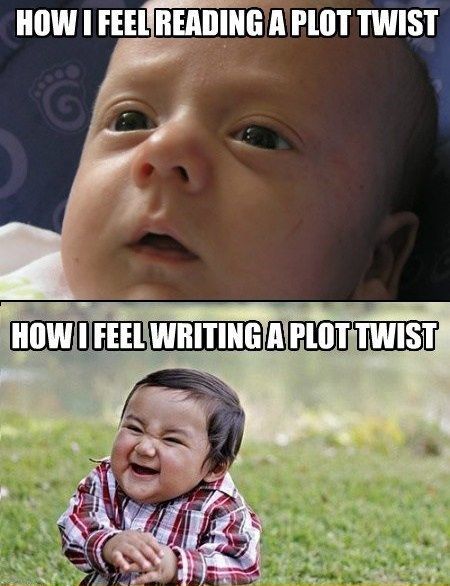Feo Takahari
 Auror
Auror
I often dissect stories that do something wrong. This time, I'd like to dissect one that does something right.
Rainbow's Edge by Vernor Vinge begins with intelligence analyst Gunberk discovering a devious plot revolving around YGBM (basically, mind control.) He kicks it up to his mentor Alfred, and they trace it to a lab in San Diego and hire a hacker to investigate. Afterwards, Alfred goes off to think by himself about the progression of terror--first two countries could destroy the world, then every country could destroy the world, and finally private citizens could destroy the world--and, well, this happens:
Yup. Vinge just revealed the bad guy's secret identity in the first freaking chapter, and it is brilliant. Because the reader knows Alfred's leading the plot, it's obvious just how hard it will be to stop his plans. This also provides a great opportunity to show Alfred's perspective and explain his actions, lending depth to what could otherwise be a cliche villain.
With that said, there's another opportunity Vinge misses here. The hacker Alfred hires is speculated to probably be a teenage script kiddie. The dust jacket specifically mentions that the protagonist's teenage granddaughter is much better with computers than he is. It's not hard to guess that the girl is the hacker even before the story starts hinting that she's involved in something big, yet as of a hundred pages into the book, Vinge is still trying to pretend it isn't obvious and not showing her POV. She's my favorite character, and I'd have loved to get her perspective, but Vinge instead tries for the surprising reveal.
What are your thoughts on surprise twists? What do you think they're useful for, and how do you decide when to use them or not use them?
Rainbow's Edge by Vernor Vinge begins with intelligence analyst Gunberk discovering a devious plot revolving around YGBM (basically, mind control.) He kicks it up to his mentor Alfred, and they trace it to a lab in San Diego and hire a hacker to investigate. Afterwards, Alfred goes off to think by himself about the progression of terror--first two countries could destroy the world, then every country could destroy the world, and finally private citizens could destroy the world--and, well, this happens:
Poor Gunberk. He had the truth exactly backwards. Effective YGBM would not be the end of everything . . . t was humankind's only hope for surviving the twenty-first century. And in San Diego, I am so close to success.
Yup. Vinge just revealed the bad guy's secret identity in the first freaking chapter, and it is brilliant. Because the reader knows Alfred's leading the plot, it's obvious just how hard it will be to stop his plans. This also provides a great opportunity to show Alfred's perspective and explain his actions, lending depth to what could otherwise be a cliche villain.
With that said, there's another opportunity Vinge misses here. The hacker Alfred hires is speculated to probably be a teenage script kiddie. The dust jacket specifically mentions that the protagonist's teenage granddaughter is much better with computers than he is. It's not hard to guess that the girl is the hacker even before the story starts hinting that she's involved in something big, yet as of a hundred pages into the book, Vinge is still trying to pretend it isn't obvious and not showing her POV. She's my favorite character, and I'd have loved to get her perspective, but Vinge instead tries for the surprising reveal.
What are your thoughts on surprise twists? What do you think they're useful for, and how do you decide when to use them or not use them?


 Myth Weaver
Myth Weaver Inkling
Inkling